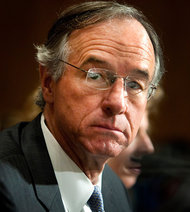7:53 p.m. | Updated
Martin Marietta Materials on Monday began a hostile $4.8 billion bid for its main rival, Vulcan Materials, betting on a resurgence in construction activity by seeking to create the biggest producer of crushed stone and gravel in the United States.
The all-stock bid by Martin Marietta Materials stands out as one of a handful of major hostile bids announced this year.
Martin Marietta Materials, which was spun out of Martin Marietta in 1994, is wagering that construction of buildings, bridges and highways — helped by a push by the Obama administration for increased spending on infrastructure — will begin picking up after a multiyear lull.
The two companies combined would own about 28 billion tons of sand, stone and gravel in quarries across the country.
Under the terms of its offer, Martin Marietta Materials will pay half of a share of its own stock for each Vulcan share. Based on Monday’s closing price, that offer is worth about $37.31 — an 11 percent premium to Vulcan’s Friday closing price.
To add pressure on Vulcan, Martin Marietta Materials also intends to name five candidates to the company’s board, the maximum possible this year, and it has begun lawsuits in Delaware and New Jersey.
“We’re putting the question out there,” C. Howard Nye, Martin Marietta Materials’ chief executive, said in a telephone interview on Monday. “To many of our shareholders, this is a no-brainer.”
Vulcan said in a statement that it would review the offer and make a recommendation to its shareholders in 10 business days.
The hostile bid came after nine years of off-and-on merger talks between the two companies, the country’s biggest makers of so-called aggregate, a crucial building material, according to a regulatory filing.
Martin Marietta Materials began seriously pursuing a deal with Vulcan in May 2010, meeting several times in New York City, Atlanta, San Diego and Raleigh, N.C., to discuss the contours of a possible merger.
But the two companies failed to reach agreements on matters like cost savings.
 Joshua Roberts/Bloomberg NewsDonald James, chief executives of Vulcan Materials, is less optimistic about the potential savings than Martin Marietta Materials is.
Joshua Roberts/Bloomberg NewsDonald James, chief executives of Vulcan Materials, is less optimistic about the potential savings than Martin Marietta Materials is.
Martin Marietta Materials has estimated that a merger would reap at least $200 million in annual cost savings.
Vulcan’s chairman and chief executive, Donald M. James, has been far more pessimistic on the benefits of a deal, estimating at one point that a combination would yield as little as $50 million in cost savings, according to Martin Marietta’s regulatory filing.
Both companies have been under pressure in recent years, hurt by reduced construction spending. But Vulcan has been hurt more, in part because of an aggressive expansion strategy that included taking on $3.1 billion in debt to buy Florida Rock in 2007.
Martin Marietta Materials has taken on less debt and remained focused on the Northeast and mid-Atlantic regions, according to an October research note by Moody’s Investors Service.
Mr. Nye said he did not expect significant antitrust problems, given that the combined company would control about 15 percent of the market for aggregates. Martin Marietta expects to begin seeking antitrust approval this week.
Another factor that Martin Marietta is betting on is that the two companies share many of the same investors, potentially making it easier to sell the benefits of merging the two.
Shareholders of both companies thus far appear to approve of the move.
Shares in Vulcan rose 15.4 percent to $38.70, above the offer, suggesting that investors think a higher offer may be possible. Shares in Martin Marietta Materials rose 1.7 percent, to $74.61.
Martin Marietta Materials is being advised by Deutsche Bank, JPMorgan Chase and the law firm Skadden, Arps, Slate, Meagher Flom.
Vulcan is being advised by Goldman Sachs and the law firm Wachtell, Lipton, Rosen Katz.
Article source: http://feeds.nytimes.com/click.phdo?i=e244a5cf2813b778c9ac9ae1386686e4